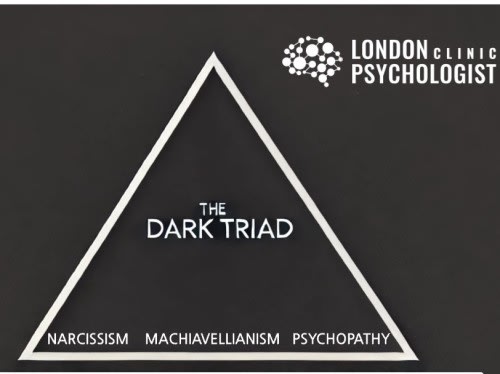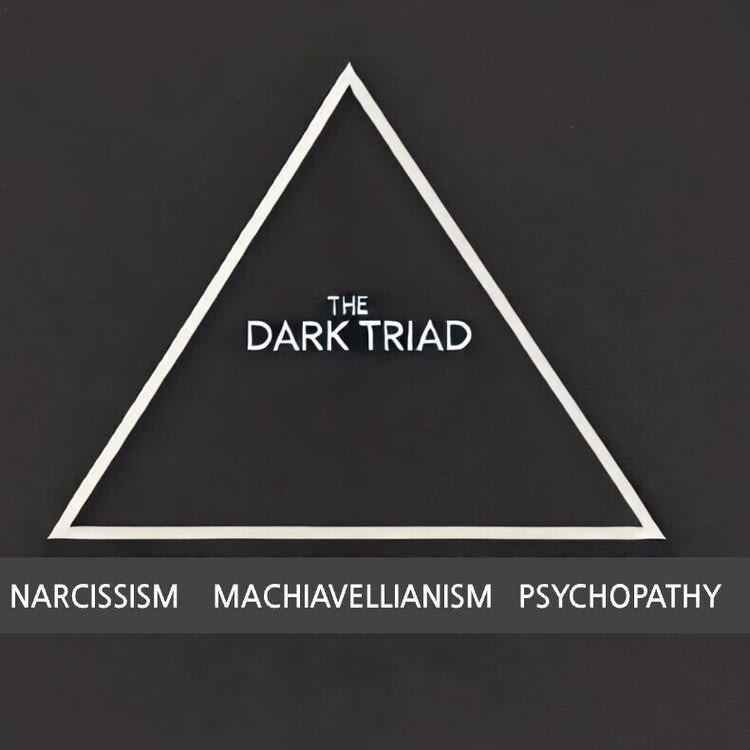Narcissism, Borderline Personality Disorder, and the 'Dark Triad'

posted 23rd September 2024

Spotting the Warning Signs: Narcissism, Borderline Personality Disorder, and the 'Dark Triad'
Understanding personality disorders can be difficult, especially when certain traits start to disrupt relationships and impact emotional well-being. Among the most complex to navigate are Narcissistic Personality Disorder (NPD) and Borderline Personality Disorder (BPD). Each presents with distinct signs, but they often share overlapping traits, which can make them hard to differentiate at first. Additionally, a more severe and dangerous personality configuration known as the Dark Triad—which includes narcissism, psychopathy (often linked to antisocial traits), and Machiavellianism—can be an especially harmful cocktail of behaviours.
This article will explore how to spot the warning signs of narcissism and BPD, as well as the traits associated with the Dark Triad, often referred to as the "trilogy of evil."
Understanding Narcissistic Personality Disorder (NPD)
Narcissism is more than just excessive self-love or vanity. Narcissistic Personality Disorder involves a deep need for admiration, a lack of empathy, and a sense of entitlement that can damage relationships and cause emotional harm to those involved.
Key Warning Signs of Narcissism:
Excessive Need for Admiration
- Narcissists thrive on attention and praise. They constantly seek validation and expect others to acknowledge their superiority, even when it's unwarranted.
Lack of Empathy
- One of the hallmark traits of narcissism is an inability to understand or care about others' emotions. They are often self-centered, dismissing other people’s feelings or needs.
Grandiosity
- Narcissists often have an inflated sense of self-importance. They believe they are uniquely special and can only be understood by or should associate with people of a high status.
Exploitation of Others
- Narcissists are skilled manipulators. They often use others to meet their own ends, whether it’s for validation, material gain, or social status.
Lack of Accountability
- Narcissists rarely take responsibility for their actions. Instead, they tend to shift blame onto others or make excuses, never accepting fault in a conflict or mistake.
Fragile Self-Esteem
- Despite their outward appearance of confidence, narcissists often have very fragile self-esteem. Criticism, no matter how constructive, is taken as a personal attack and can lead to explosive reactions or silent grudges.
Spotting Borderline Personality Disorder (BPD)
- Borderline Personality Disorder (BPD), while often confused with narcissism, has its own set of unique challenges. Those with BPD typically experience intense emotional instability, fear of abandonment, and difficulty maintaining stable relationships. The core of BPD often revolves around intense and unstable emotions, which can cause a person to swing between idealising and devaluing others rapidly.
Key Warning Signs of BPD:
- Fear of Abandonment
Individuals with BPD often have an overwhelming fear of being abandoned or rejected. This fear may cause them to act in extreme ways to avoid perceived abandonment, even if it’s not real.
Intense, Unstable Relationships
- People with BPD tend to form very intense but unstable relationships. They often idealise a person one moment, only to devalue them soon after. These shifts can lead to frequent conflict and emotional turmoil.
Emotional Instability
- Individuals with BPD are prone to intense mood swings, which can feel like an emotional rollercoaster. These rapid emotional shifts can occur in response to minor events or perceived slights.
Impulsive Behaviour
- Impulsivity is a common trait in BPD. This may manifest in reckless behaviours like substance abuse, unsafe sex, binge eating, or spending sprees.
Chronic Feelings of Emptiness
- Those with BPD often report a persistent feeling of emptiness or dissatisfaction with life. This void can lead to desperate attempts to fill the emptiness with external validation or risky behavior.
Self-harm or Suicidal Behaviour
Self-harming behaviors, suicidal threats, or attempts are common in individuals with BPD. These actions may occur during moments of intense distress or perceived rejection.
The Dark Triad: Narcissism, Machiavellianism, and Psychopathy
The Dark Triad is a psychological concept that combines three dangerous and manipulative personality traits: narcissism, Machiavellianism, and psychopathy.
Narcissism
We’ve already discussed narcissism, but within the Dark Triad, it refers to an extreme focus on self-importance, entitlement, and a need for admiration.
Machiavellianism
Named after the political philosopher Niccolò Machiavelli, Machiavellianism refers to a manipulative personality style marked by cunning, duplicity, and a focus on self-interest. Those with this trait are skilled at manipulating and deceiving others to achieve their goals, often with little regard for morality.
Psychopathy (Linked to Antisocial Personality Disorder)
Psychopathy, often overlapping with Antisocial Personality Disorder (ASPD), is characterised by a lack of empathy, remorse, and a tendency toward callous, impulsive behaviour. Psychopaths are typically emotionally cold and are prone to engaging in risky or harmful behaviours without feeling guilt or fear of consequences.
Signs of the Dark Triad:
- Manipulation and Deceit
Individuals with traits from the Dark Triad are often highly manipulative, using charm or deceit to control or exploit others.
Lack of Remorse
- Psychopaths and those with narcissistic traits exhibit little to no remorse for their actions, even when they cause harm to others.
Exploitative Relationships
- Relationships with Dark Triad individuals are usually based on exploitation. They view others as tools to be used for their own gain, whether it’s for personal, financial, or emotional satisfaction.
Superficial Charm
- Many people with Dark Triad traits can be charming, charismatic, and engaging, which helps them manipulate others more easily.
Impulsivity and Recklessness
- Psychopathic traits often lead to impulsive decision-making and risky behaviours. They may engage in criminal activity, aggressive outbursts, or other harmful actions without regard for the consequences.
How to Protect Yourself
If you suspect someone in your life displays traits of narcissism, BPD, or even the Dark Triad, it’s important to prioritise your emotional and psychological well-being. Here are some ways to protect yourself:
1. Set Boundaries
Establish and enforce clear emotional and physical boundaries. Narcissists and individuals with personality disorders often test these limits, so it’s important to remain firm in protecting your space.
2. Don’t Engage in Manipulation
Recognise manipulation tactics like gaslighting, guilt-tripping, or love-bombing, and resist engaging. Stay grounded in your own reality and avoid being drawn into emotionally volatile situations.
3. Seek Professional Help
If a relationship with a narcissist, BPD individual, or someone exhibiting Dark Triad traits is causing significant emotional harm, consider seeking therapy. A professional can help you develop coping strategies and recognise patterns of abuse.
4. Know When to Walk Away
In some cases, the best option for self-preservation is to distance yourself from toxic relationships. If possible, create a support system and take steps to exit relationships that are emotionally damaging or abusive.
While personality disorders like narcissism and BPD, as well as Dark Triad traits, can create significant challenges in relationships, understanding the warning signs can help you navigate these complex dynamics. Whether through emotional manipulation, instability, or toxic control, these traits can have a profound impact on those around them. Recognising these patterns is the first step toward protecting yourself and fostering healthier, more fulfilling relationships.



